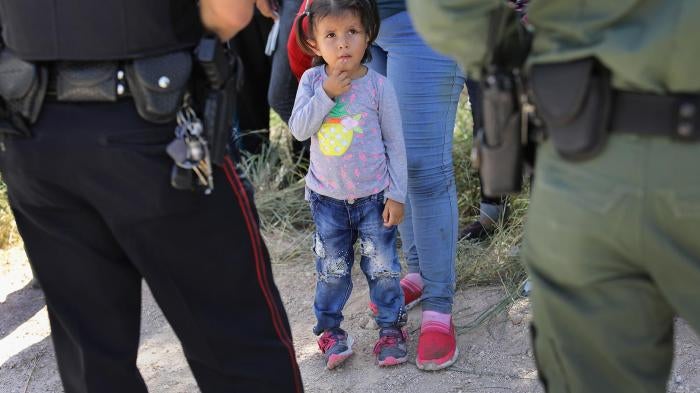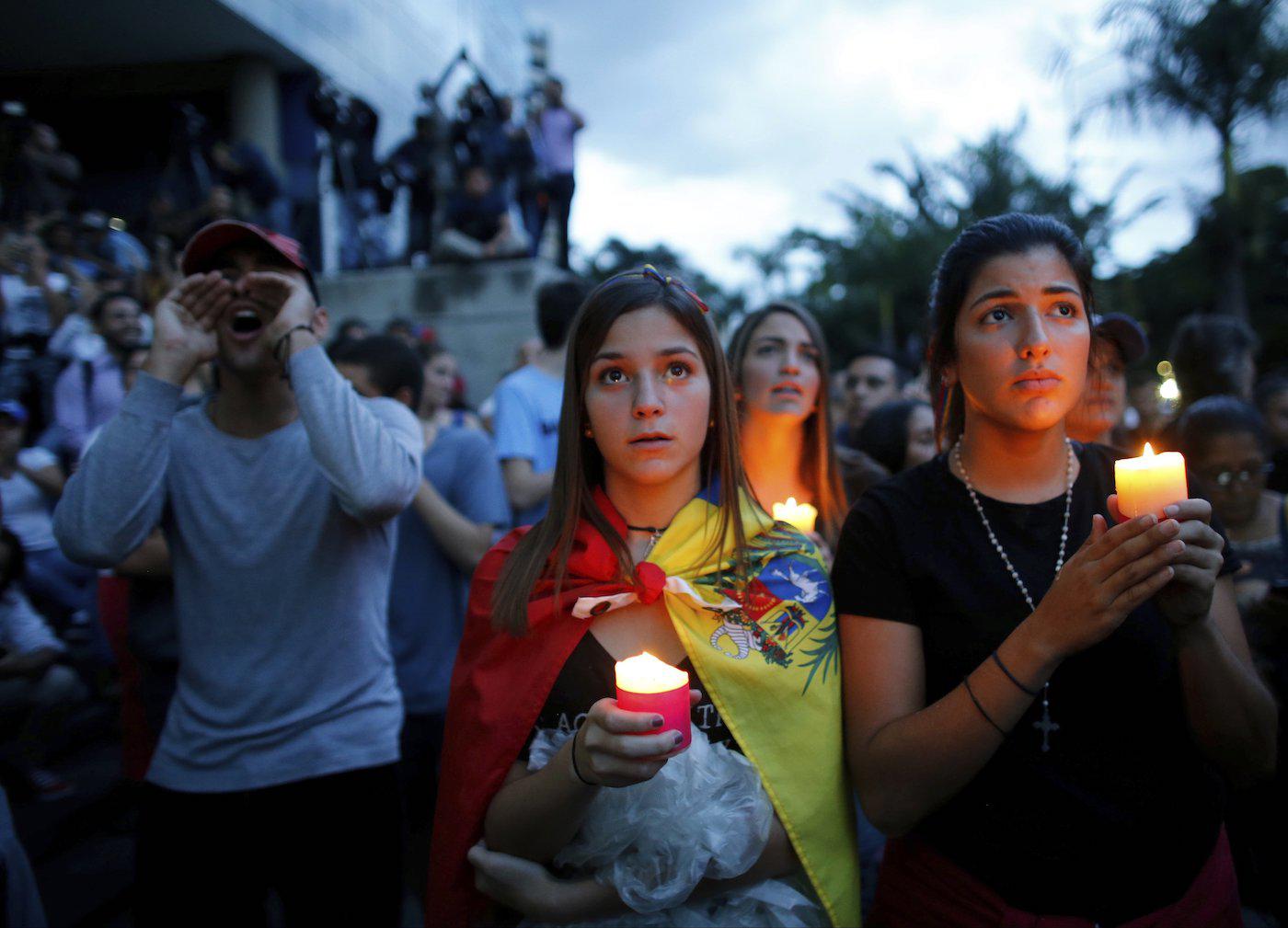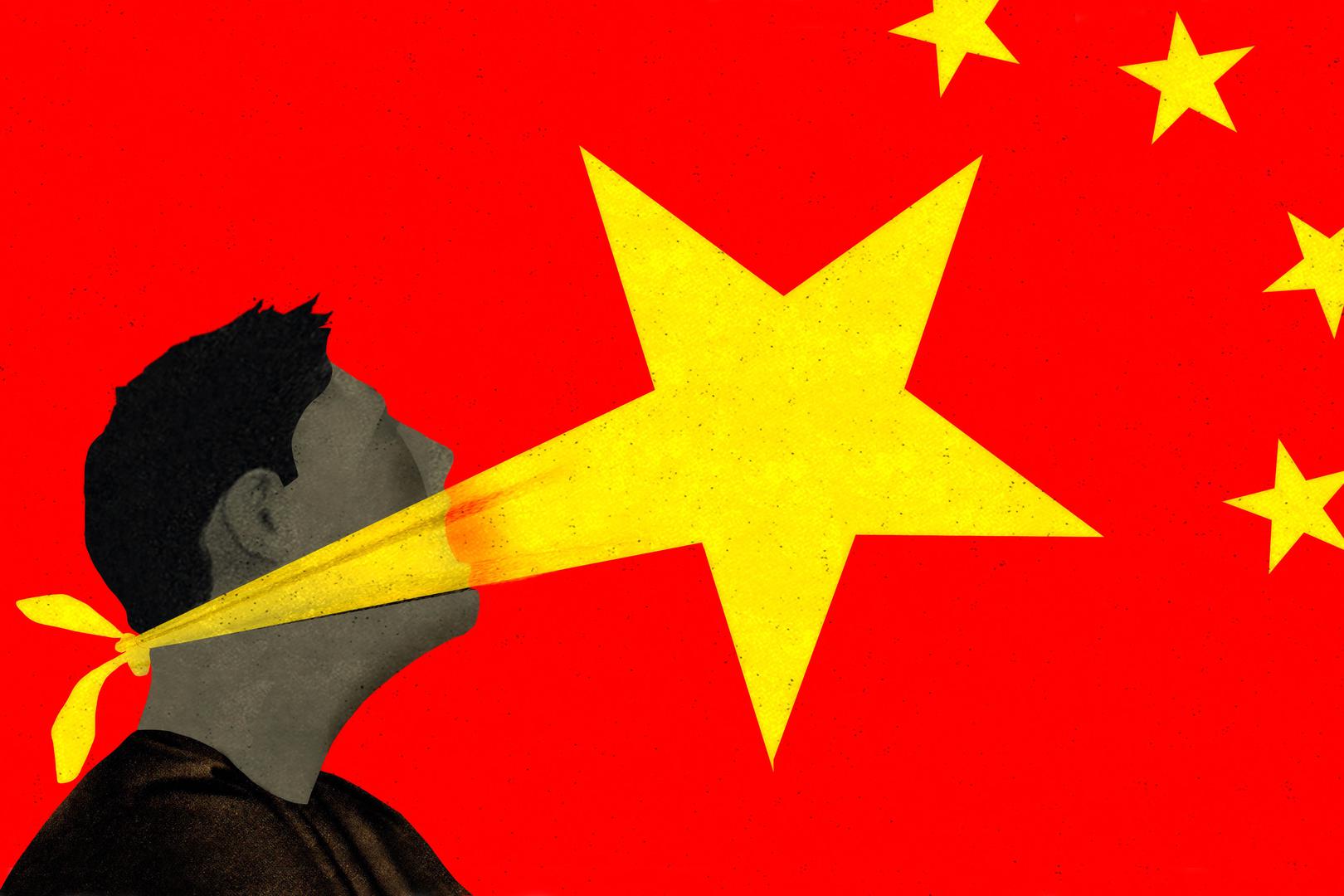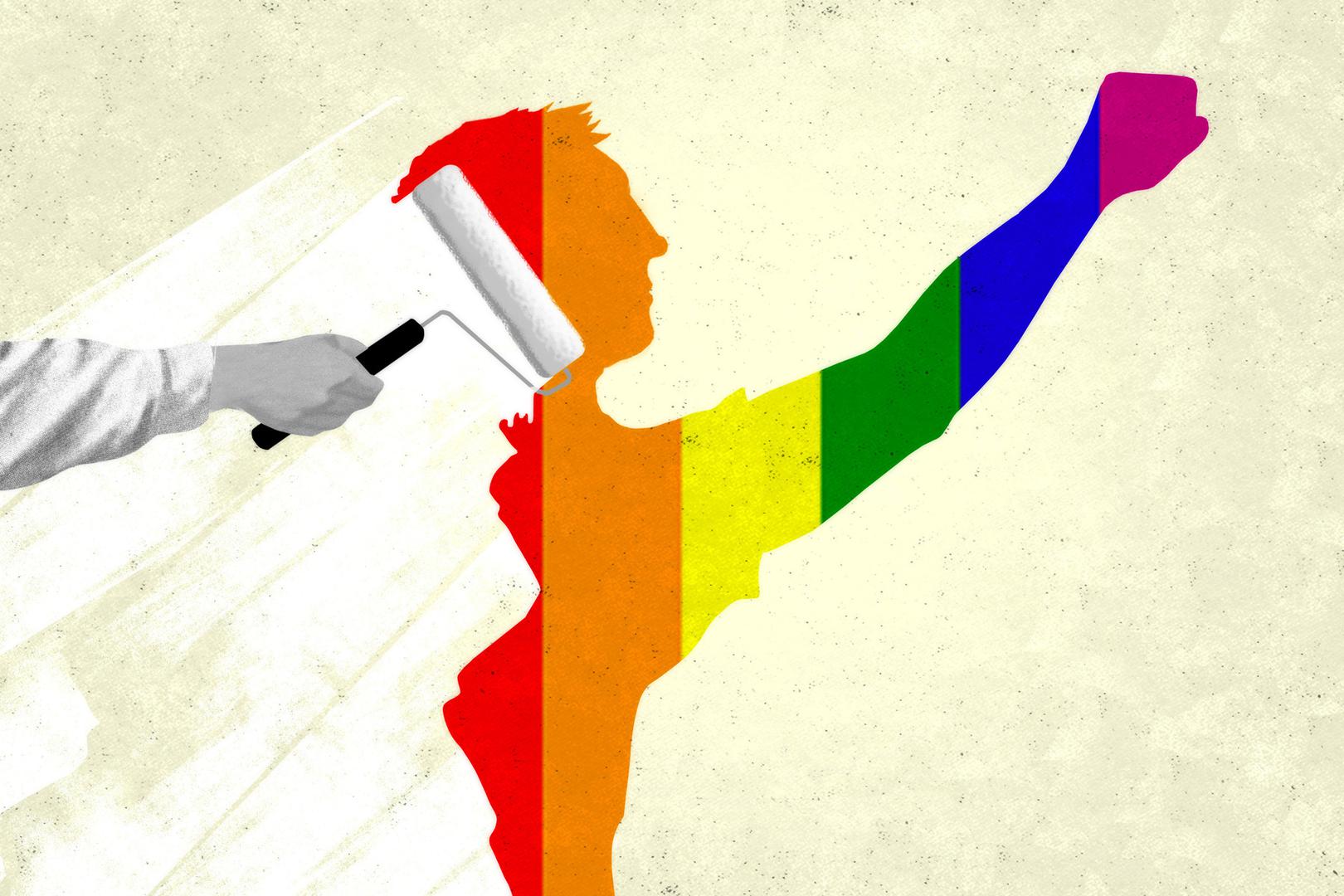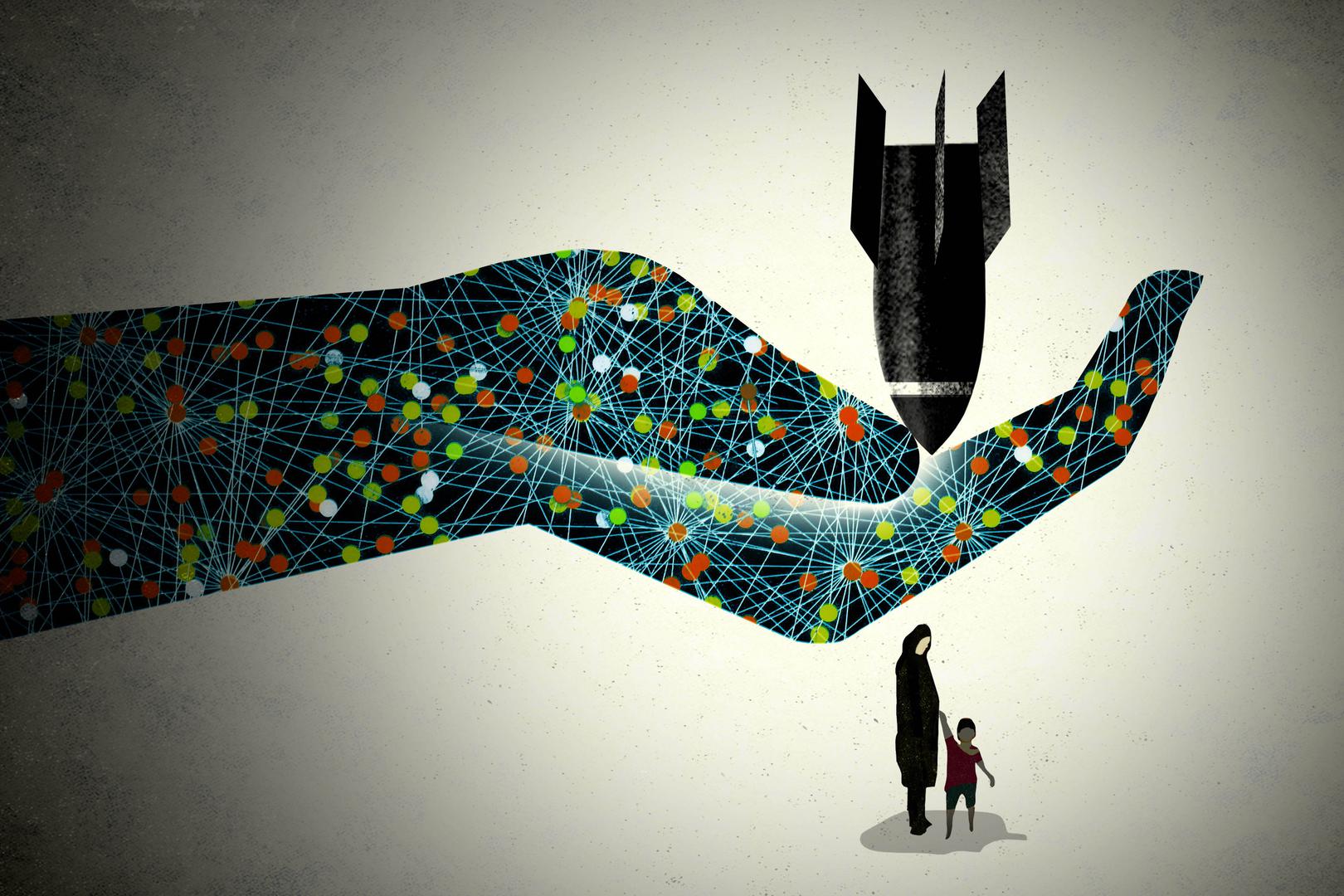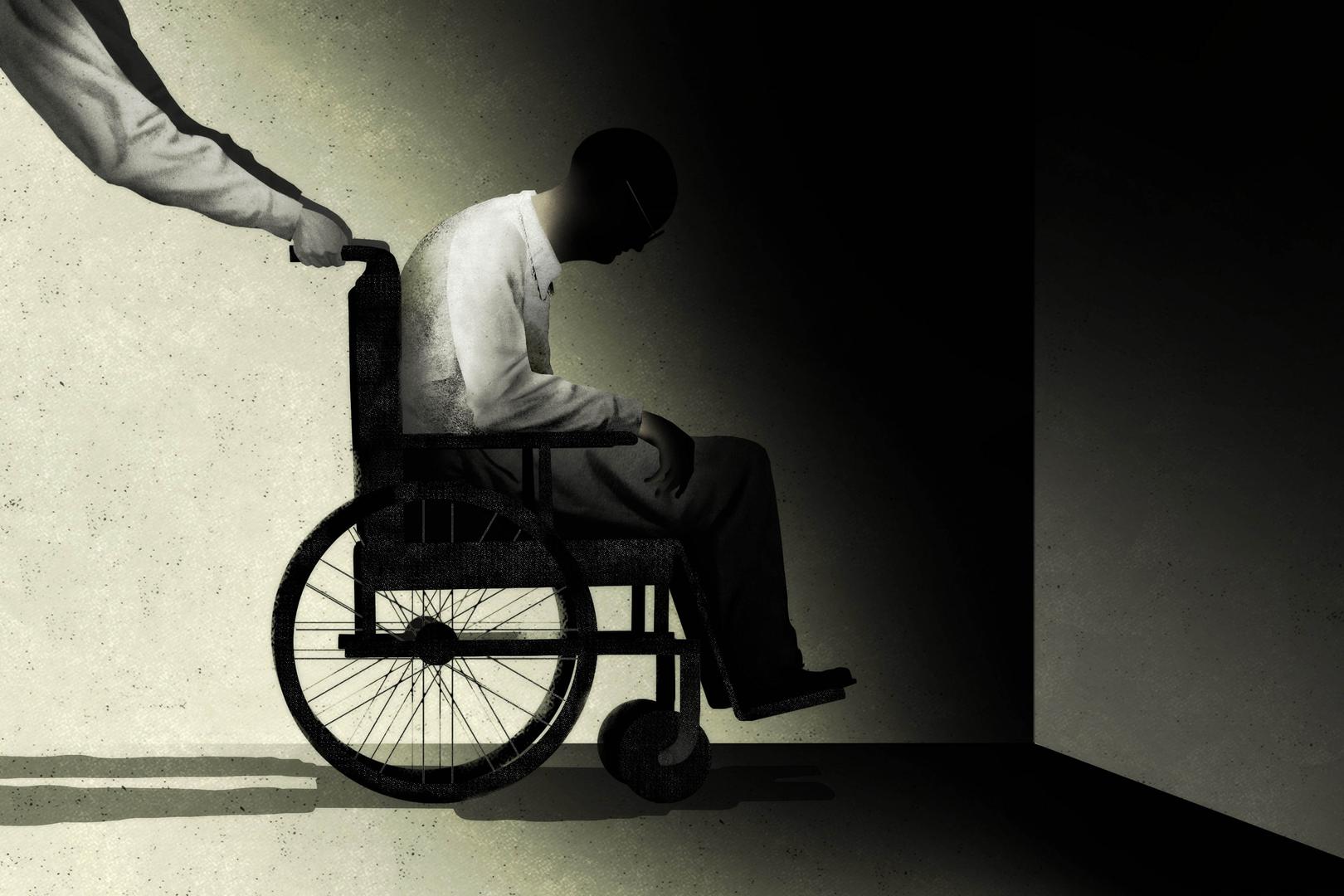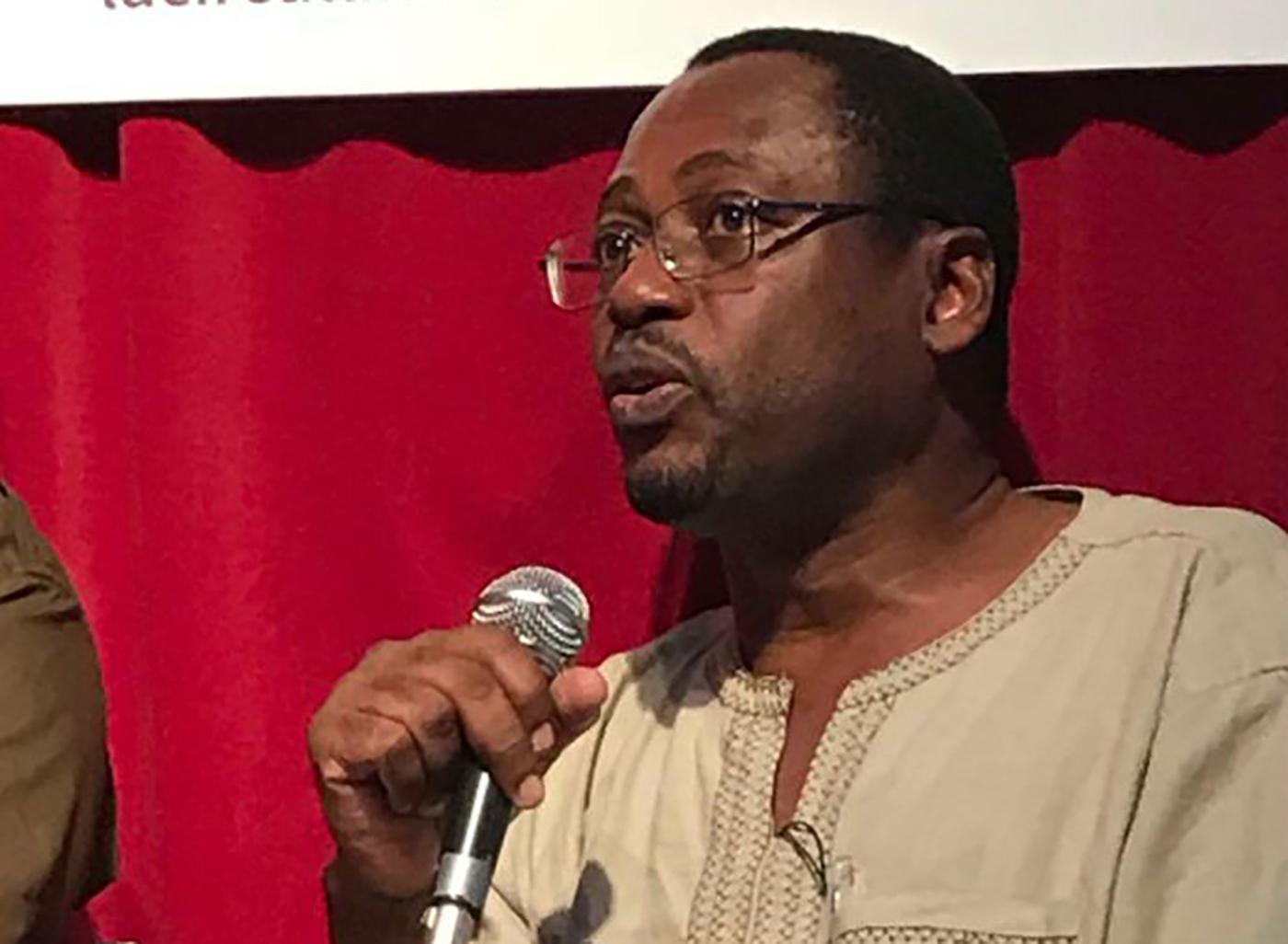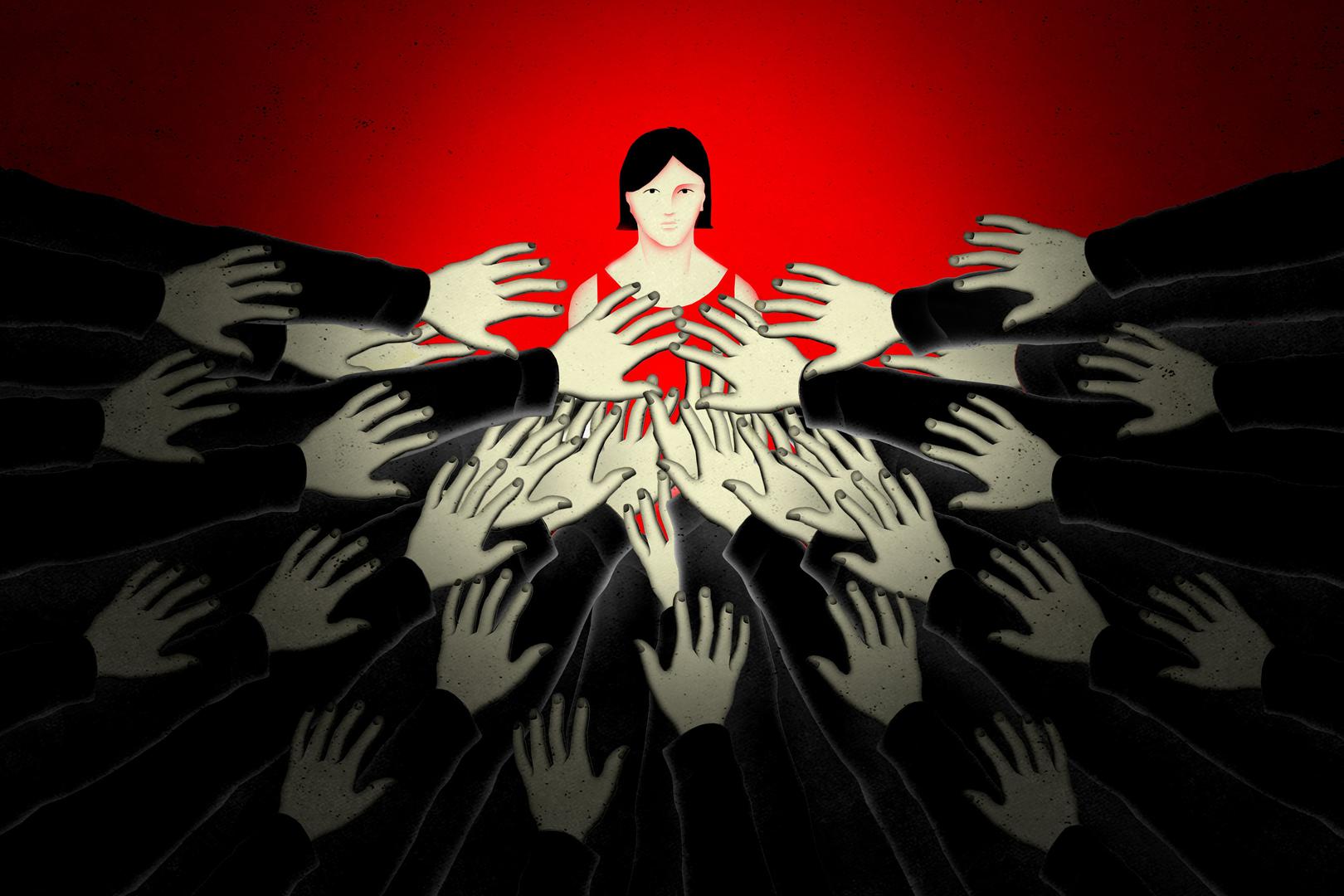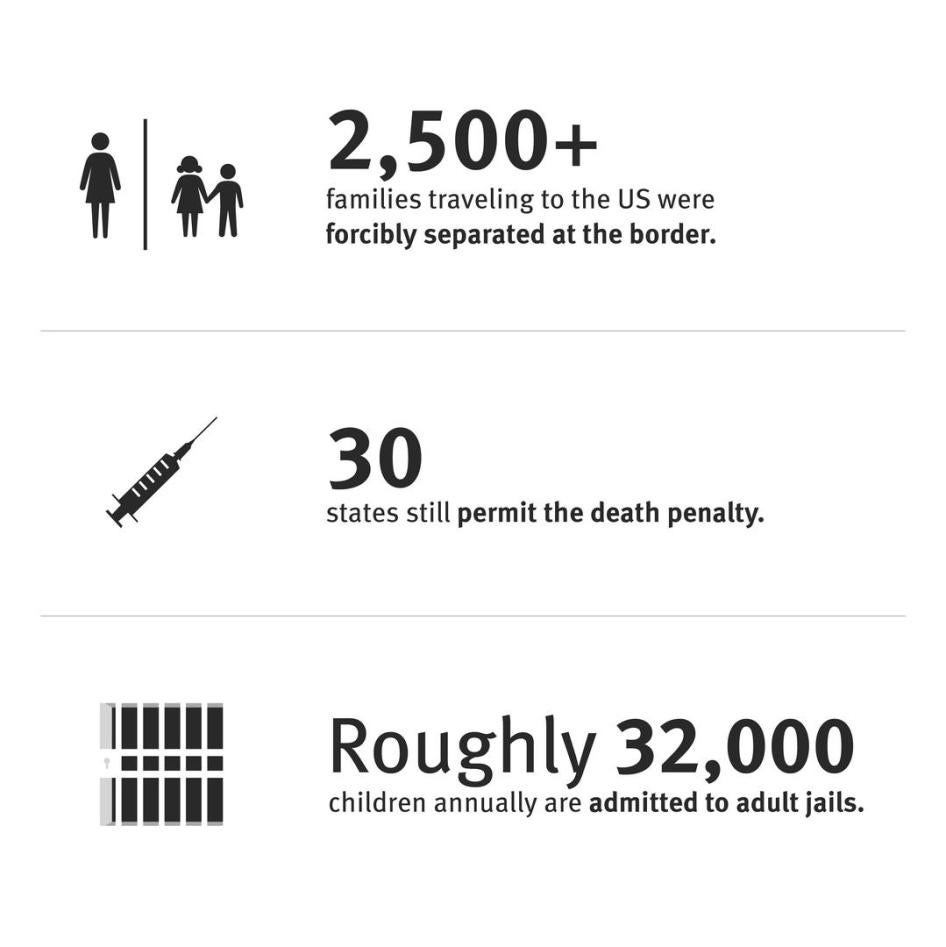The United States continued to move backward on human rights at home and abroad in the second year of President Donald Trump’s administration. With Trump’s Republican party controlling the legislative branch in 2018, his administration and Congress were able to pass laws, implement regulations, and carry out policies that violate or undermine human rights.
Despite Trump signaling support for minimal reforms, his administration rolled back initiatives meant to reduce over-incarceration in the US, implemented an array of anti-immigration policies, and worked to undermine a national insurance program that helps Americans obtain affordable health care, including important reproductive care for women.
The Trump administration also continued to support abusive governments abroad militarily, financially, and diplomatically. Though it has expressed support for some international initiatives aimed at sanctioning individuals and governments committing human rights abuses, overall administration policy undermined multilateral institutions and international judicial bodies seeking to hold people accountable for egregious human rights violations.
Harsh Criminal Sentencing
State and federal jails and prisons continue to hold over 2 million people, with another 4.5 million on probation or parole. Women are the fastest growing correctional population nationwide, increasing by more than 700 percent between 1980 and 2016. Oklahoma incarcerates more women per capita than any other US state. In September, Human Rights Watch documented the lasting harm of jailing mothers pretrial, many of whom simply cannot afford bail in that state.
Former US Attorney General Jeff Sessions rescinded policies instructing prosecutors to avoid charging crimes that would trigger long mandatory minimum sentences and were aimed at curtailing racial disparities in the federal system. Sessions also rescinded a Justice Department directive giving federal prosecutors discretion to not prosecute marijuana offenses in the 10 states where marijuana has been legalized for adult consumption.
Millions of people still cannot vote due to a patchwork of felony disenfranchisement laws across the country. However, in November, Florida voters approved a ballot initiative during the mid-term elections that restored the right to vote for 1.4 million residents with felony convictions. The initiative was one of several that states passed that advanced criminal justice reform, including an initiative in Colorado that removed language in the state constitution that permitted convicted criminals to be forced to work in prison without pay or restitution; an initiative in Florida, allowing sentencing reforms to be retroactive; one in Michigan that legalized marijuana for recreational use; and another in Washington state that strengthened police accountability.
The death penalty is still permissible in 30 states. According to the Death Penalty Information Center, 21 people in eight states had been executed by the end of November, all in the south and midwest of the country. There were 11 executions in Texas. All but one of these executions were committed by lethal injection, the other by electric chair. Trump and administration officials have called for the death penalty for drug sellers.
Racial Disparities, Drug Policy, and Policing
Racial disparities permeate every part of the US criminal justice system. Black people are 13 percent of the population but close to 40 percent of those in prisons. They are incarcerated at more than five times the rate of white people. Black people use illegal drugs at similar rates to white people, but suffer drug arrests at significantly higher rates.
According to the Washington Post, police reportedly shot and killed 876 people in the US as of the beginning of October. Of those killed, whose race is known, 22 percent were black. Of the unarmed people killed by police, 39 percent were black. The Justice Department rolled back efforts to investigate local police departments following credible reports of systemic constitutional violations. Some state governments have taken on this oversight role. Racial disparities in police use of force, arrests, citations, and traffic stops continue to exist.
Children in the Criminal and Juvenile Justice Systems
According to the Justice Department, the juvenile arrest rate has been declining but dramatic racial disparities persist: children of color are disproportionately represented at every stage, and in 37 states rates of incarceration were higher for black children than for white, according to the Sentencing Project.
According to the Citizens Committee for Children, roughly 32,000 children under 18 are admitted annually to adult jails. All 50 states continue to prosecute some children in adult criminal courts. Approximately 1,300 people have life without parole sentences for crimes committed under 18, according to the Campaign for the Fair Sentencing of Youth.
In October, the Washington State Supreme Court ruled that life sentences without parole for crimes committed below age 18 violated the state constitution. In all, 21 states and the District of Columbia now prohibit juvenile life without parole. California passed a law in October that ends the sentencing of 14 and 15-year-olds in adult court. And in April, New York ended the automatic trial of 16 and 17-year-olds in adult court, although children of these—or younger—ages, who are accused of violent crimes, will still begin their cases in adult court with the possibility of transfer to the juvenile system.
Poverty and Criminal Justice
Poor people accused of crimes are often jailed because judges require money bail as a condition of release, forcing people not convicted of any crime to stay behind bars for long periods of time awaiting trial, and resulting in coerced guilty pleas. A movement to reduce the use of money bail is growing but many states, including California—which passed a bill eliminating money bail in August—are replacing money bail with risk assessment tools that could entrench discrimination while failing to lower rates of pretrial incarceration.
Many local jurisdictions impose excessive fees and fines for even minor violations of law. If unpaid, these debts can result in arrests that feed a cycle of incarceration and increased poverty. Similarly, some states privatize misdemeanor probation services, which penalizes poor people who commit minor violations and leads to abuses.
In June 2018, the United Nations (UN) special rapporteur on extreme poverty and human rights issued a report sharply criticizing the US for its policies towards the poor.
Incidents of Hate Crimes
During one week in October, men espousing far right and white supremacist views allegedly committed three separate violent acts: one carried out a mass shooting at a synagogue in Pittsburgh, killing 11 worshipers and injuring more; another mailed deadly pipe bombs to leading Democratic figures; and another shot two African-Americans in a Louisville grocery store, killing both. Multiple organizations and the government, which use different methodologies to collect different types of information about hate crimes, reported an increase in the number of hate-motivated incidents from prior years.
Rights of Non-Citizens
More than 2,500 families were forcibly separated at the US border as the Trump administration targeted parents traveling with children for criminal prosecution. As part of this policy, children with disabilities were separated from their families, including in one case, a 10-year-old girl with Down Syndrome from her mother.
Though a federal court and tremendous public outcry put a stop to mass separations in late June, reunifications of hundreds of families lagged for months. According to media reports, families continued to be separated on a smaller scale after Trump issued an executive order supposedly ending the practice. Reportedly, many of these continued separations were based on vague or unsubstantiated allegations of wrongdoing or minor violations against the parents. Ramped-up criminal prosecutions for illegal entry continued. Mental health professionals warned that separation was very likely to cause trauma, both immediate and long-lasting.
Hundreds of parents were deported separately from their children, including many whose asylum claims were improperly dismissed by US border agents. A June administrative ruling by former Attorney General Jeff Sessions sought to restrict access to asylum for people claiming persecution by non-state actors, including victims of domestic and gang violence. In November, the administration issued an interim final rule barring migrants who enter between ports of entry from asylum, in violation of US and international law; it was temporarily enjoined by a federal judge. A peaceful march by migrants on November 26 seeking asylum at the US-Mexico border ended with US border agents lobbing teargas projectiles at migrants, including young children.
The US Supreme Court upheld an executive order issued by Trump banning travel to the US from several predominantly Muslim countries, which Human Rights Watch and those challenging the ban said was discriminatory. The administration also announced Temporary Protected Status would expire for almost 400,000 deeply-rooted immigrants from Sudan, Haiti, El Salvador, Nicaragua, Honduras, and Nepal from late 2018 to early 2020, placing them at risk of deportation and separation from home and family. Arrests and deportations of undocumented people arrested in the interior of the United States mainly through minimal contact with the criminal justice system or in large-scale workplace raids continued to mount, without regard to their rights to home and family.
Immigration authorities sought to detain more people—including vulnerable populations like children and pregnant women—in the already-sprawling immigration detention system. Immigration authorities sought to remove legal limits to detaining children in families indefinitely. Of 15 recent deaths in immigration detention, Human Rights Watch found that eight were linked to poor medical care.
The fate of almost 800,000 young immigrants who hold work permits and protection from deportation under Deferred Action for Childhood Arrivals (DACA) remained uncertain as court challenges continued around the administration’s 2017 decision to end the program. Proposed regulatory changes to the definition of “public charge” under US immigration law threatened to disrupt essential public health and benefit programs supporting citizen children of non-citizens.
Right to Health
To date, attempts in Congress to repeal the Affordable Care Act (ACA)—legislation that has
greatly expanded access to health care for millions of Americans—have failed. However, a tax reform eliminated the individual mandate penalties for not participating in the program required in the law. The Congressional Budget Office estimated this could leave 13 million people without insurance coverage. In addition, the Medicaid program, private insurance subsidies, non-discrimination protections for lesbian, gay, bisexual, and transgender (LGBT) people, and other key elements of the ACA were targets of federal and state action that threaten to restrict access to health care. Many states with federal support have imposed work requirements, drug testing, and other barriers to Medicaid eligibility for low income individuals.
In 2017, a record 72,000 Americans died of drug overdose. The Trump administration’s response to the continuing crisis was increasingly punitive, as criminal penalties were enhanced for fentanyl sale and distribution. In many states, criminal laws block expansion of proven public health interventions, such as syringe exchange programs and supervised consumption sites, which reduce transmission of infectious disease and prevent overdose. Reduced access to Medicaid threatens to put drug treatment out of reach for millions of Americans.
Older People’s Rights
Human Rights Watch reported in February 2018 that nursing homes across the US routinely give antipsychotic drugs to residents with dementia to control their behavior, often without individuals’ consent. This abusive practice remains widespread and can amount to cruel, inhumane or degrading treatment.
Women’s and Girls’ Rights
Revelations related to sexual harassment and misconduct by high-profile men continued to be made as the #MeToo movement expanded virally, highlighting abuses suffered by women at work and in public places. The Senate confirmed Brett Kavanaugh for a seat on the US Supreme Court, a lifetime appointment, without thoroughly investigating credible allegations of sexual assault or other aspects of his record, about which Human Rights Watch expressed serious concern.
Congress passed legislation in 2017 making it easier for states to restrict Title X grants by creating eligibility requirements that could exclude certain family planning providers, like Planned Parenthood. Title X is a national family planning program that funds services to more than 4 million Americans. The Department of Health and Human Services (HHS) proposed a “gag” rule in May to stop doctors receiving Title X funding from giving women the full range of pregnancy options and to eliminate a requirement that doctors give neutral and factual information to pregnant women. HHS received more than half-a-million comments in response to the notice of rule-making. At time of writing, a final rule had not been issued.
In 2017, HHS issued a rule exempting nearly any employer claiming religious or moral objections to birth control from the ACA’s requirement that they provide contraceptive coverage as part of their employee health insurance plans. In March 2018, it proposed another rule that would dramatically expand healthcare providers’ ability to turn away patients based on religious or moral objections, including women seeking reproductive health services and lesbian, gay, bisexual, and transgender people. At time of writing, the rule had not been finalized.
A few states took steps to proactively protect or expand protections for women’s health. However, several states adopted highly restrictive laws on abortion and reproductive health. Two states—Delaware and New Jersey—in 2018 banned all marriage before age 18, but child marriage remains legal in the remaining 48 states.
Sexual Orientation and Gender Identity
The Department of Health and Human Services announced plans to roll back a federal rule clarifying that the Affordable Care Act’s prohibition on sex discrimination includes discrimination based on gender identity.
In 2018, Oklahoma, Kansas, and South Carolina enacted laws permitting adoption and foster care providers asserting a religious objection to refuse to place children with LGBT people. A similar provision was added to an appropriations bill in the US House of Representatives but did not become law.
At time of writing, 19 states have laws expressly banning discrimination based on both sexual orientation and gender identity in employment, housing, and public accommodations. Wisconsin and New York prohibit discrimination based on sexual orientation but not gender identity, and Utah only prohibits discrimination in employment and housing. Michigan, New York, and Pennsylvania interpret their statutory prohibition on sex discrimination to include discrimination based on sexual orientation and/or gender identity.
National Security
In March, the US Senate confirmed Gina Haspel as director of the Central Intelligence Agency (CIA). In 2002, Haspel ran a CIA detention center in Thailand where she oversaw torture, and in 2005 advocated for, and helped to destroy, videotaped evidence of CIA torture.
The US is assisting Syrian Democratic Forces (SDF) run and secure detention facilities in northern Syria where the SDF were holding nearly 600 men from 47 countries accused of being Islamic State (ISIS) fighters or members. At time of writing, the US had also transferred at least eight detainees from SDF custody to Lebanon, seven to Macedonia, and other foreign nationals to Iraq. One dual US-Saudi citizen was held in US custody for over a year until October, when the US was finally pressured through litigation to release him. The US was also reportedly considering transferring hundreds more from SDF custody to Iraq, Tunisia, and other countries for detention. It was not clear what kind of process to safeguard against abuse the US was providing detainees transferred, but the transfers raised concerns that detainees may face torture or unfair trial, and not have an opportunity to challenge their transfers before they occur.
The US was also reportedly considering transferring two detainees whom the SDF was holding in northern Syria to the Guantanamo Bay detention facility. The men, both British-accused ISIS members who have had their British citizenship withdrawn, were accused of killing US citizens among others in territory once held by ISIS in Syria.
The US continues to hold 31 men indefinitely without charge at Guantanamo, all of whom have been there for 12 years or more. It also continued to prosecute 7 men for terrorist offenses, including the September 11, 2001 attacks on the US, in Guantanamo’s military commissions system— which does not meet international fair trial standards and has been plagued by procedural problems and years of delay—and held two men who have already been convicted by the commissions.
Following reports that US forces interrogated detainees in secret prisons run by foreign forces in Yemen who had tortured detainees, which built on similar reports from 2017, the US enacted a law requiring the US Defense Secretary to determine whether US forces or their coalition partners in Yemen violated the laws of war or US laws barring the provision of US assistance to foreign forces that commit gross human rights violations.
Surveillance and Data Protection
In January, Congress re-authorized Section 702 of the Foreign Intelligence Surveillance Act, a law permitting the warrantless surveillance of foreign people and entities overseas, as well as the capture and search of Americans’ communications in the process.
In January, Human Rights Watch reported that US authorities may be failing to notify other defendants about the way intelligence or other information used in their criminal cases was obtained, instead deliberately concealing its origins by finding alternative ways to obtain the same information, a practice known as “parallel construction.”
The director of National Intelligence reported in May that the number of telephone call records that intelligence authorities collect under the USA Patriot Act more than tripled in 2017, to more than 534 million. The next month, the National Security Agency revealed that it was deleting years’ worth of these records after receiving data it “was not authorized to receive.”
Congress adopted the Clarifying Lawful Overseas Use of Data (“CLOUD”) Act, which allows authorized foreign governments to demand data from US companies under weak and incomplete rights standards. At time of writing, the US was negotiating an agreement with the United Kingdom under the law, which would empower the UK to demand data under standards lower than those required by the US Constitution. The UK would then be able to pass this data back to the US, enabling US authorities to evade domestic privacy laws.
In a positive development, the Supreme Court decided in Carpenter v. United States that police need a warrant for access to extensive historic mobile phone location data, which reveals a person’s past movements and may be highly sensitive. However, evolving technology created new rights risks, as illustrated by revelations about Amazon’s marketing of facial recognition technology to police departments. In the US, legal protections for personal data held by companies remained insufficient, as demonstrated by data analysis firm Cambridge Analytica’s massive access to Facebook users’ data.
Freedom of Expression and Assembly
President Trump continued to launch public attacks on news media throughout 2018, including by characterizing “a large percentage of the media” as “the enemy of the people.” His remarks prompted hundreds of media outlets to publish coordinated defenses of press freedom in August. Journalists also experienced deadly violence and threats, including the shooting of five staff of an Annapolis, Maryland, newspaper in June.
Several police efforts to monitor protesters, including people of color, were reported or litigated during the year. US technology companies faced increased pressure from lawmakers to restrict speech on their platforms. In April, a new law aimed at curbing online sex trafficking made websites liable for what users say and do on their platforms. It also threatened to silence speech about consent-based sex work and other sexual activity.
Foreign Policy
The United States continued to withhold or reprogram humanitarian aid and funding to international bodies, eliminating all contributions to the United Nations Relief and Works Agency that aids Palestinian refugees, and significantly cutting US financial contributions to the UN Population Fund.
On February 7, the State Department released a six-month review of the Trump administration’s Mexico City Policy, which blocks federal funding for non-governmental organizations that provide abortion counseling or referrals or advocate to decriminalize abortion or expand services, was silent on how it impacted women and girls.
In March, the State Department approved a weapons sale of nearly $1 billion to Saudi Arabia, which was ultimately cleared by Congress. Also that month, the Senate narrowly failed to pass a measure to end US military support to Saudi that would have restricted US participation in the Yemen conflict on grounds that it was unlawful.
The US continued to sell weapons to the coalition as well as provide targeting information and, in September, certified to Congress that the Saudi-led coalition had taken steps to reduce the risk to civilians. In November, the US announced it would stop refueling Saudi aircraft fighting in Yemen. The US response to the murder of Washington Post columnist and Virginia resident Jamal Khashoggi by Saudi state agents was inconsistent, with President Trump initially issuing a harsh rebuke but then questioning the reported CIA findings that the crown prince ordered Khashoggi’s murder. The administration sanctioned 17 Saudis who were allegedly involved in Khashoggi’s murder, but Secretary of State Mike Pompeo asserted that the US-Saudi partnership remained vital.
President Trump fired Secretary of State Rex Tillerson in March and nominated then-CIA Director Pompeo to be his successor. In April, the Senate confirmed Pompeo.
In March, the State Department’s annual human rights country reports were released with reduced references to reproductive rights and violence against women. In May, Trump announced the US would withdraw from the Iran nuclear deal, despite the UN’s confirmation that Iran continues to uphold its end of the agreement.
During weeks of protests at the Gaza border with Israel, the United States celebrated its embassy relocation to West Jerusalem on May 14, 2018. The move coincided with one of the deadliest days of the protests, with more than 60 Palestinian demonstrators killed. The US did not publicly condemn Israel’s excessive use of force.
In June, Trump met with North Korean leader Kim Jong-un in Singapore. The following month, he met with Russian President Vladimir Putin. In August, he met with Kenyan President Uhuru Kenyatta, only his second meeting with an African leader. He publicly said nothing about the three governments’ poor human rights records.
The United States officially withdrew from the UN Human Rights Council in June 2018 citing bias against Israel and the body’s failure to reform, making it the first country ever to withdraw from the body. Shortly after, US Ambassador to the UN Nikki Haley wrote to Human Rights Watch and 16 other groups blaming them for the US’ decision to withdraw, citing attempts to undermine efforts to improve the council.
Overall, Haley’s record on human rights at the UN was mixed. She defended Israeli abuses but pushed the Security Council to approve an arms embargo for South Sudan and kept pressure on the Democratic Republic of Congo. Haley announced she would resign at the end of 2018.
The United States continued to impose visa restrictions and asset freezes on perpetrators of grave human rights violations and corruption. At time of writing, according to the Treasury Department, the United States had sanctioned 101 people under Executive Order 13818 “Blocking the Property of Persons Involved in Serious Human Rights Abuse or Corruption,” which expands upon the Global Magnitsky Human Rights Accountability Act, in addition to the numerous other designations under different sanctions programs. Using this authority, as well as others, the United States has expanded human rights sanctions against the Iranian government, Venezuelan officials, and a number of Myanmar military officials and entities.
The State Department hosted its inaugural “Ministerial to Advance Religious Freedom” in Washington in July 2018—an event attend by foreign governments, civil society, and religious leaders, aimed at advancing religious liberties around the world. Iraq, Myanmar, and China, among other countries, were discussed. The US rhetorically condemned and pursued sanctions in response to China’s abuses, but those efforts were undercut by President Trump’s strong rhetorical support of President Xi Jinping.
In August, the State Department released a long-awaited report on the abuses committed by Myanmar’s military against the Rohingya population since August 2017, but included no legal determinations or policy recommendations.
Also in September, National Security Advisor John Bolton announced that the Trump administration would not cooperate with the International Criminal Court (ICC) and threatened a number of retaliatory measures should ICC investigations reach US, Israeli, or other allied country citizens. He made clear that one of the reasons for this position was a pending ICC prosecutor request to open an investigation in Afghanistan that could include crimes of torture allegedly committed by US military and CIA personnel. President Trump reiterated this position in a speech to the UN General Assembly.
